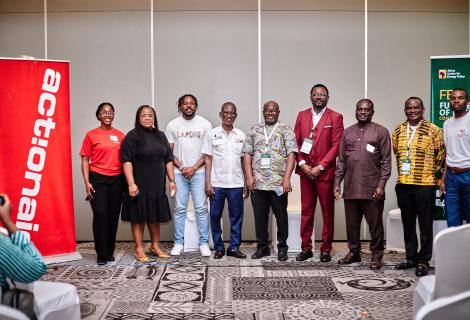Promoting a Fair Green Energy Transition in Ghana: AAG Urges Stakeholders to Invest in Green Energy and Food Sovereignty.

Ghana’s energy sector stands at a defining crossroads. On one hand, the country has made commendable progress in electrification, reaching 86% national access by 2024, one of the highest rates in Sub-Saharan Africa.
On the other, Ghana remains heavily dependent on fossil fuels, with oil and gas supplying more than 60% of electricity generation, while renewables contribute less than 2% to the national mix. This is far below the government’s target of 10% renewables by 2030.
This gap between ambition and reality makes one truth undeniable: the transition of green energy must be accelerated, and it must be just, inclusive, and people centered. At the forefront of this call is ActionAid Ghana, championing reforms to ensure climate financing and renewable energy policies deliver tangible benefits for grassroots communities—particularly smallholder women farmers who are most vulnerable to the climate crisis.
Advocating for Systemic Reform
ActionAid Ghana has consistently pushed for reforms that put people, not profit, at the heart of Ghana’s energy future.
• National Dialogue (June 2025): ActionAid Ghana convened a high-level forum to explore how debt restructuring and realigned development financing can advance food sovereignty and climate resilience. The dialogue brought together government leaders, civil society, and grassroots movements, underscoring the urgent need for financing frameworks that allow Ghana to invest in clean, affordable energy without deepening debt stress.
• Future of Energy Conference 2025 (FEC2025): At a side event themed “Financing a Just Green Energy Transition for Sustainable Food Sovereignty”, ActionAid Ghana partnered with the Africa Centre for Energy Policy (ACEP) to spotlight the nexus between energy and food systems. The message was clear: the transition cannot succeed without community ownership and inclusivity.
• Policy Reform Agenda: Beyond convenings, ActionAid continues to press for reforms in both development finance and renewable energy policy, ensuring that resources flow directly to communities rather than reinforcing top-down approaches that marginalize grassroots actors.
Centering Women in the Green Economy
The shift to renewable energy is not gender neutral. It reshapes livelihoods, power, and opportunity; areas where women, particularly smallholder farmers, are most impacted yet too often excluded.
• Climate-Resilient Agriculture: Through the Promoting Opportunities for Women’s Empowerment and Rights (POWER) project, ActionAid equipped women farmers with sustainable farming practices that improve yields while protecting ecosystems.
• Women in Energy Innovation: The organisation also champions women’s inclusion in renewable energy financing and capacity-building, ensuring they become leaders in Ghana’s energy future, not just passive beneficiaries. Today, over 2000 women spread across Ghana's northern region are leading sustainable agricultural practices in their communities.
Building Community Resilience
ActionAid Ghana’s interventions over the past years showed how grassroots solutions can drive national transformation. From its Active Citizenship for Social Justice (2023–2028) country strategy paper VI, which strategically embeds green economy promotion within broader struggles for social and economic justice.
Similarly, AAG's new project in the Upper West Region, the EU & BMZ-Funded Resilience Project (2025) titled Strengthening Community Resilience through Community Action Plans is equipping communities and smallholder farmers through climate-smart agriculture and various adaptation strategies.
Furthermore, through National Climate Advocacy dialogues and engagement, with the likes of the National Climate Justice Conference, the #FundOurFuture Campaign, Financing for Development, among others is actively pushing for stronger civil society inclusion in Ghana’s energy transition framework to guarantee accountability, transparency, and equity.
Looking Ahead: Partnership for Transformation
At FEC2025, ActionAid Ghana reaffirmed its commitment to advancing community-centered clean energy solutions. AAG envisions a future powered not only by solar panels and wind turbines, but also by inclusive financing models, decentralised renewable energy systems, and the empowerment of youth and women innovators.
For ActionAid Ghana, the just transition is not simply about reducing emissions; it is about transforming livelihoods, strengthening food sovereignty, and shifting power back into the hands of communities.
-End-
By Jacqueline Parditey.